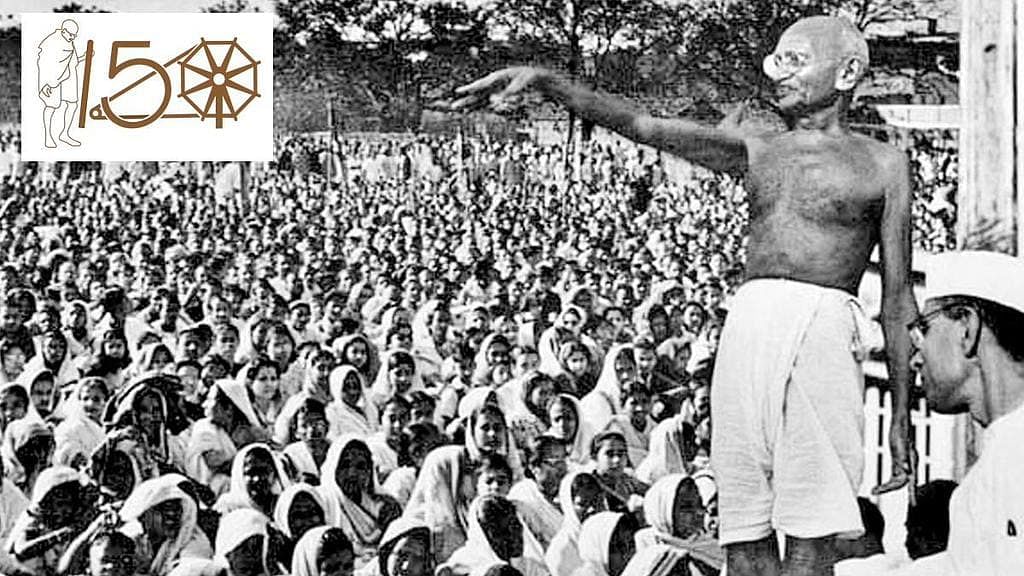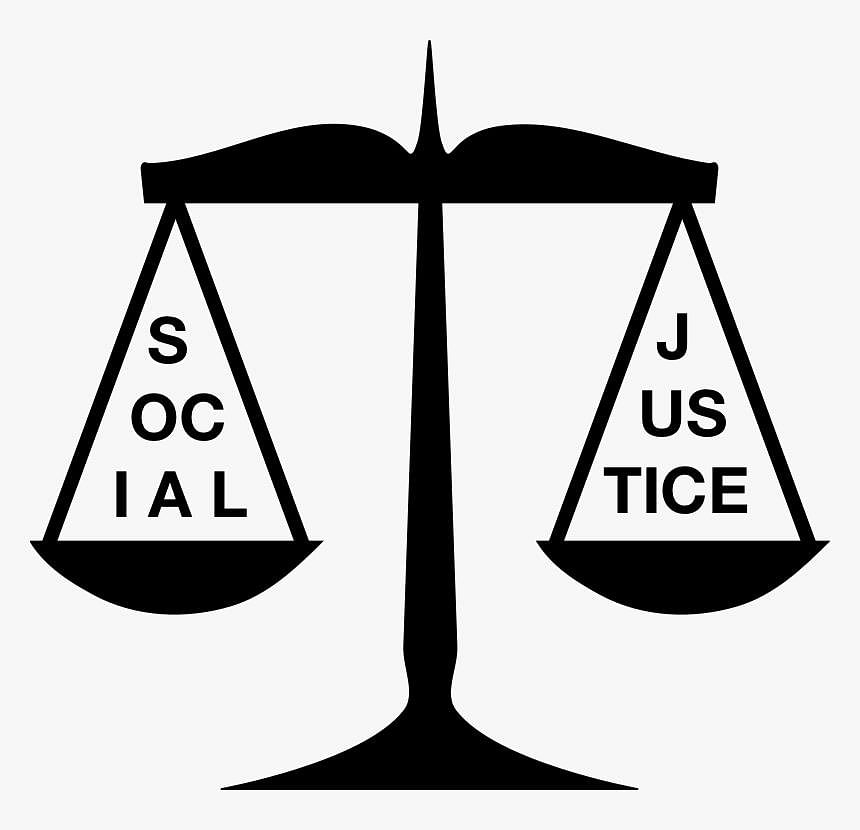NCERT Summary: Philosophy of the Constitution- 1 | Indian Polity for UPSC CSE PDF Download
Introduction
- Some people believe that a constitution merely consists of laws and that laws are one thing, values and morality, quite another. Therefore, we can have only a legalistic, not a political philosophy approach to the Constitution. It is true that all laws do not have a moral content, but many laws are closely connected to our deeply held values.
For example, a law might prohibit discrimination of persons on grounds of language or religion. Such a law is connected to the idea of equality. Such a law exists because we value equality. Therefore, there is a connection between laws and moral values. - One should look upon the constitution as a document that is based on a certain moral vision, and adopt a political philosophy approach to the constitution. What do we mean by a political philosophy approach to the constitution? We have three things in mind.
 (i) First, we need to understand the conceptual structure of the constitution. What does this mean? It means that we must ask questions like what are the possible meanings of terms used in the constitution such as ‘rights’, ‘citizenship’, ‘minority’ or ‘democracy’?
(i) First, we need to understand the conceptual structure of the constitution. What does this mean? It means that we must ask questions like what are the possible meanings of terms used in the constitution such as ‘rights’, ‘citizenship’, ‘minority’ or ‘democracy’?
(ii) Furthermore, we must attempt to work out a coherent vision of society and polity conditional upon an interpretation of the key concepts of the constitution. We must have a better grasp of the set of ideals embedded in the constitution.
(iii) Our final point is that the Indian Constitution must be read in conjunction with the Constituent Assembly Debates in order to refine and raise to a higher theoretical plane, the justification of values embedded in the Constitution. A philosophical treatment of a value is incomplete if a detailed justification for it is not provided. When the framers of the Constitution chose to guide Indian society and polity by a set of values, there must have been a corresponding set of reasons. Many of them, though, may not have been fully explained. - A political philosophy approach to the constitution is needed not only to find out the moral content expressed in it and to evaluate its claims but possibly to use it to arbitrate between varying interpretations of the many core values in our polity. It is obvious that many of its ideals are challenged, discussed, debated, and contested in different political arenas, in the legislatures. in party forums, in the press, in schools and universities. These ideals are variously interpreted and sometimes wilfully manipulated to suit part is a short term interest. We must, therefore, examine whether or not a serious disjunction exists between the constitutional ideal and its expression in other areas.
- Sometimes, the same ideal is interpreted differently by different institutions. We need to compare these differing interpretations. Since the expression of the ideal in the constitution has considerable authority it must be used to arbitrate in conflict of interpretation overvalues or ideals. Our Constitution can perform this job of arbitration.
Question for NCERT Summary: Philosophy of the Constitution- 1Try yourself:Democracy is based on the idea of
View Solution
Question for NCERT Summary: Philosophy of the Constitution- 1Try yourself:Democracy is based on the idea of
View Solution
Constitution as Means of Democratic Transformation
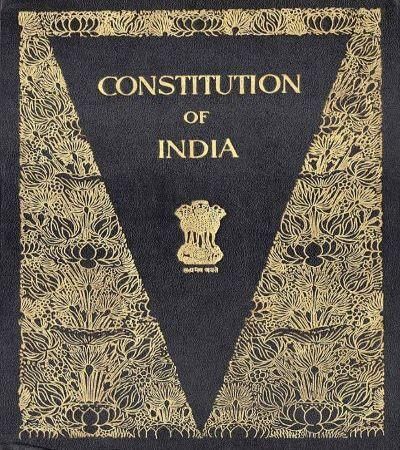
- It is widely agreed that one reason for having constitutions is the need to restrict the exercise of power. Modern states are excessively powerful. They are believed to have a monopoly over force and coercion. What if institutions of such states fall into wrong hands who abuse this power? Even if these institutions were created for our safety and well-being, they can easily turn against us.
- Experience of state power the world over shows that most states are prone to harming the interests of at least some individuals and groups. If so, we need to draw the rules of the game in such a way that this tendency of states is continuously checked. Constitutions provide these basic rules and therefore, prevent states from turning tyrannical.
- Constitutions also provide peaceful, democratic means to bring about social transformation. Moreover, for a hitherto colonised people, constitutions announce and embody the first real exercise of political self-determination. Nehru understood both these points well. The demand for a Constituent Assembly. He claimed represented a collective demand for full self-determination because only a Constituent Assembly of elected representatives of the Indian people had the right to frame India’s constitution without external interference.
- Second, he argued, the Constituent Assembly is not just a body of people or a gathering of able lawyers. Rather, it is a ‘nation on the move, throwing away the shell of its past political and possibly social structure, and fashioning for itself a new garment of its own making.’ The Indian Constitution was designed to break the shackles of traditional social hierarchies and to usher in a new era of freedom, equality and justice.
- This approach had the potential of changing the theory of constitutional democracy together: according to this approach, constitutions exist not only to limit people in power but to empower those who traditionally have been deprived of it. Constitutions can give vulnerable people the power to achieve Collective good.
Why do we need to go back to the Constituent Assembly?
- Why look backwards and bind ourselves to the past? That may be the job of a legal historian — to go into the past and search for the basis of legal and political ideas. But why should students of politics be interested in studying the intentions and Concerns of those who framed the Constitution? Why not take account of changed circumstances and define a new normative function of the Constitution?
- In the context of America — where the Constitution was written in the late 18th century- it is absurd to apply the values and standards of that era to the 21st century.
- However, in India, the world of the original framers and our present-day world may not have changed so drastically. In terms of our values, ideals, and conception, we have not separated ourselves from the world of the Constituent Assembly. A history of our Constitution is still very much a history of the present.
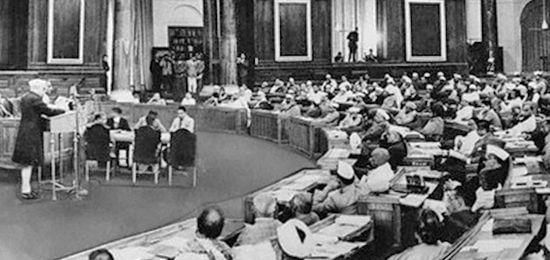 The Constituent Assembly, in one of its Meetings
The Constituent Assembly, in one of its Meetings
- Furthermore, we may have forgotten the real point underlying several of our legal and political practices, simply because somewhere down the road we began to take them for granted. These reasons have now slipped into the background, screened off from our consciousness even though they still provide the organizational principle to current practices.
- When the going is good, this forgetting is harmless. But when these practices are challenged or threatened, neglect of the underlying principles can be harmful. In short, to get a handle on current constitutional practice, to grasp their value and meaning, we may have no option but to go back in time to the Constituent Assembly debates and perhaps even further back in time to the colonial era. Therefore, we need to remember and keep revisiting the political philosophy underlying our Constitution.
What Is the Political Philosophy of Our Constitution?
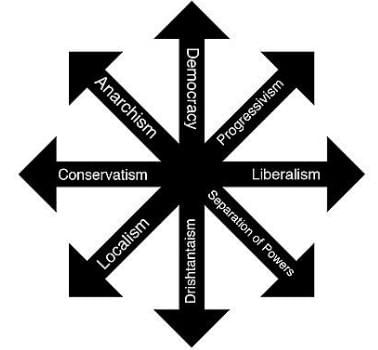 Different types of Political Philosophy
Different types of Political Philosophy- It is hard to describe this philosophy in one word. It resists any single label because it is liberal, democratic, egalitarian, secular, and federal, open to community values, sensitive to the needs of religious and linguistic minorities as well as historically disadvantaged groups, and committed to building a common national identity. In short, it is committed to freedom, equality, social justice, and some form of national unity. But underneath all this, there is a clear emphasis on peaceful and democratic measures for putting this philosophy into practice.
➢ Individual freedom
- The first point to note about the Constitution is its commitment to individual freedom. This commitment did not emerge miraculously out of calm deliberations around a table. Rather, it was the product of the continuous intellectual and political activity of well over a century.
- As early as the beginning of the nineteenth century, Rammohan Roy protested against the curtailment of the freedom of the press by the British colonial state. Roy argued that a state responsive to the needs of individuals must provide them the means by which their needs are communicated. Therefore, the state must permit unlimited liberty of publication. Likewise, Indians continued to demand a free press throughout British rule.
 Gathering during Rowlatt Act
Gathering during Rowlatt Act
- It is not surprising therefore that freedom of expression is an integral part of the Indian Constitution. So is the freedom from arbitrary arrest. After all, the infamous Rowlatt Act, which the national movement opposed so vehemently, sought to deny this basic freedom. These and other individual freedoms such as freedom of conscience are part of the liberal ideology.
- On this basis, we can say that the Indian Constitution has a pretty strong liberal character. In the chapter on fundamental rights, we have already seen how the Constitution values individual freedom, It might be recalled that for over forty years before the adoption of the Constitution, every single resolution, scheme, bill and report of the Indian National Congress mentioned individual rights, not just in passing but as a non-negotiable value.
➢ Social Justice
- When we say that the Indian Constitution is liberal, we do not mean that it is liberal only in the classical western sense.
Classical liberalism always privileges rights of the individuals over demands of social justice and community values.
The liberalism of the Indian Constitution differs from this version in two ways:
1. It was always linked to social justice. The best example of this is the provision for reservations for Scheduled castes and Scheduled tribes in the Constitution.
The makers of the Constitution believed that the mere granting of the right to equality was not enough to overcome age-old injustices suffered by these groups or to give real meaning to their right to vote. Special constitutional measures were required to advance their interests. Therefore the constitution-makers provided a number of special measures to protect the interests of Scheduled Castes and Scheduled Tribes such as the reservation of seats in legislatures.
The Constitution also made it possible for the government to reserve public sector jobs for these groups. Respect for diversity and minority rights the Indian Constitution encourages equal respect between communities. This was not easy in our country, first because communities do not always have a relationship of equality; they tend to have hierarchical relationships with one another (as in the case of caste).
2. When these communities do see each other as equals, they also tend to become rivals (as in the case of religious communities). This was a huge challenge for the makers of the Constitution: How to make communities liberal in their approach and foster a sense of equal respect among them under existing conditions of hierarchy or intense rivalry?
- It would have been very easy to resolve this problem by not recognising communities at all, as most western liberal constitutions do. But this would have been unworkable and undesirable in our country. This is not because Indians are attached to communities more than others. Individuals everywhere also belong to cultural communities and every such community has its own values, traditions, customs, and language shared by its members.
For example, individuals in France or Germany belong to a linguistic community and are deeply attached to it. What makes us different is that we have more open to acknowledging the value of communities. More importantly, India is a land of multiple cultural communities. Unlike Germany or France, we have several linguistic and religious communities. It was important to ensure that no can community systematically dominates others. This made it mandatory for our Constitution to recognise community basted rights. - One such right is the right of religious communities to establish and run their own educational institutions. Such institutions may receive money from the government. This provision shows that the Indian Constitution does not see religion merely as a private matter concerning the individual.
|
144 videos|611 docs|204 tests
|
FAQs on NCERT Summary: Philosophy of the Constitution- 1 - Indian Polity for UPSC CSE
| 1. Why do we need to go back to the Constituent Assembly? |  |
| 2. What is the political philosophy of our Constitution? |  |
| 3. How can the Constitution serve as a means of democratic transformation? |  |
| 4. What role does the Constituent Assembly play in shaping the Constitution? |  |
| 5. How does revisiting the Constituent Assembly's debates and discussions help in understanding the Constitution? |  |

|
Explore Courses for UPSC exam
|

|
 (i) First, we need to understand the conceptual structure of the constitution. What does this mean? It means that we must ask questions like what are the possible meanings of terms used in the constitution such as ‘rights’, ‘citizenship’, ‘minority’ or ‘democracy’?
(i) First, we need to understand the conceptual structure of the constitution. What does this mean? It means that we must ask questions like what are the possible meanings of terms used in the constitution such as ‘rights’, ‘citizenship’, ‘minority’ or ‘democracy’?